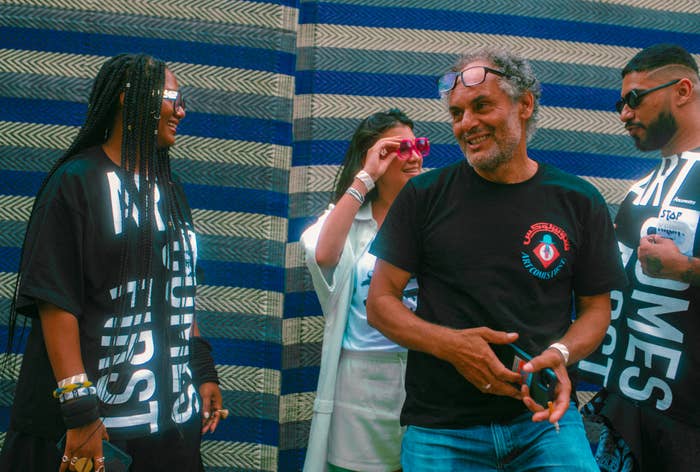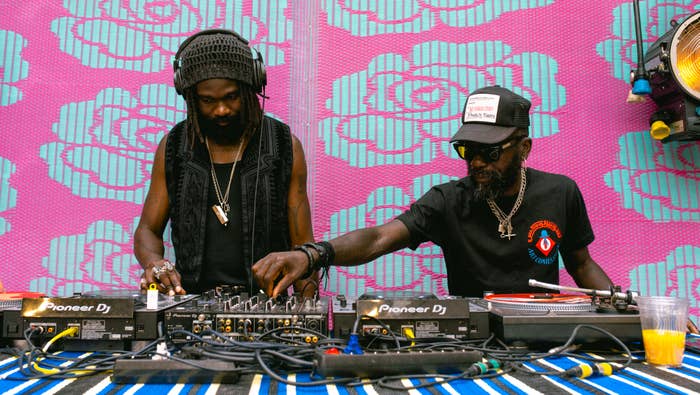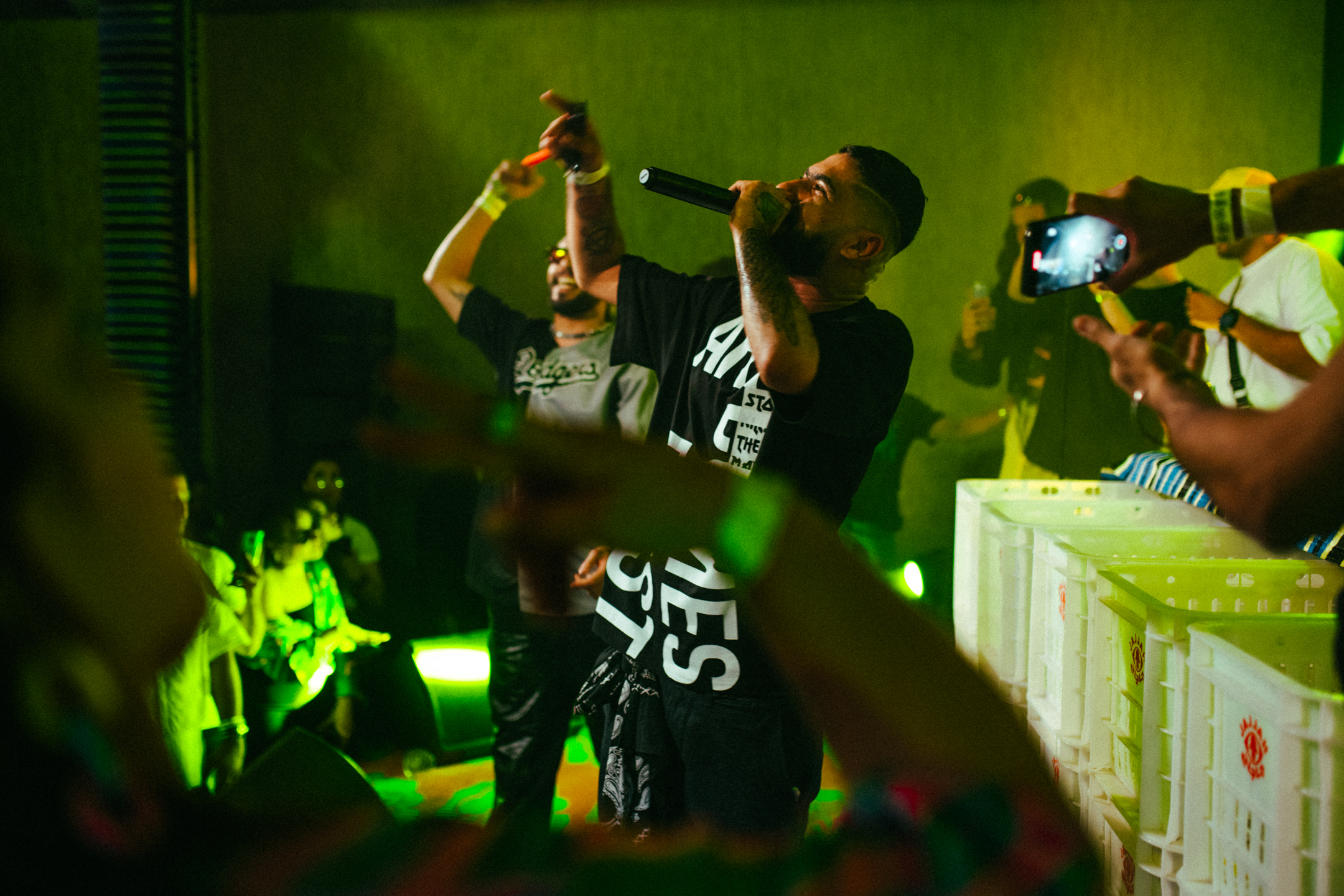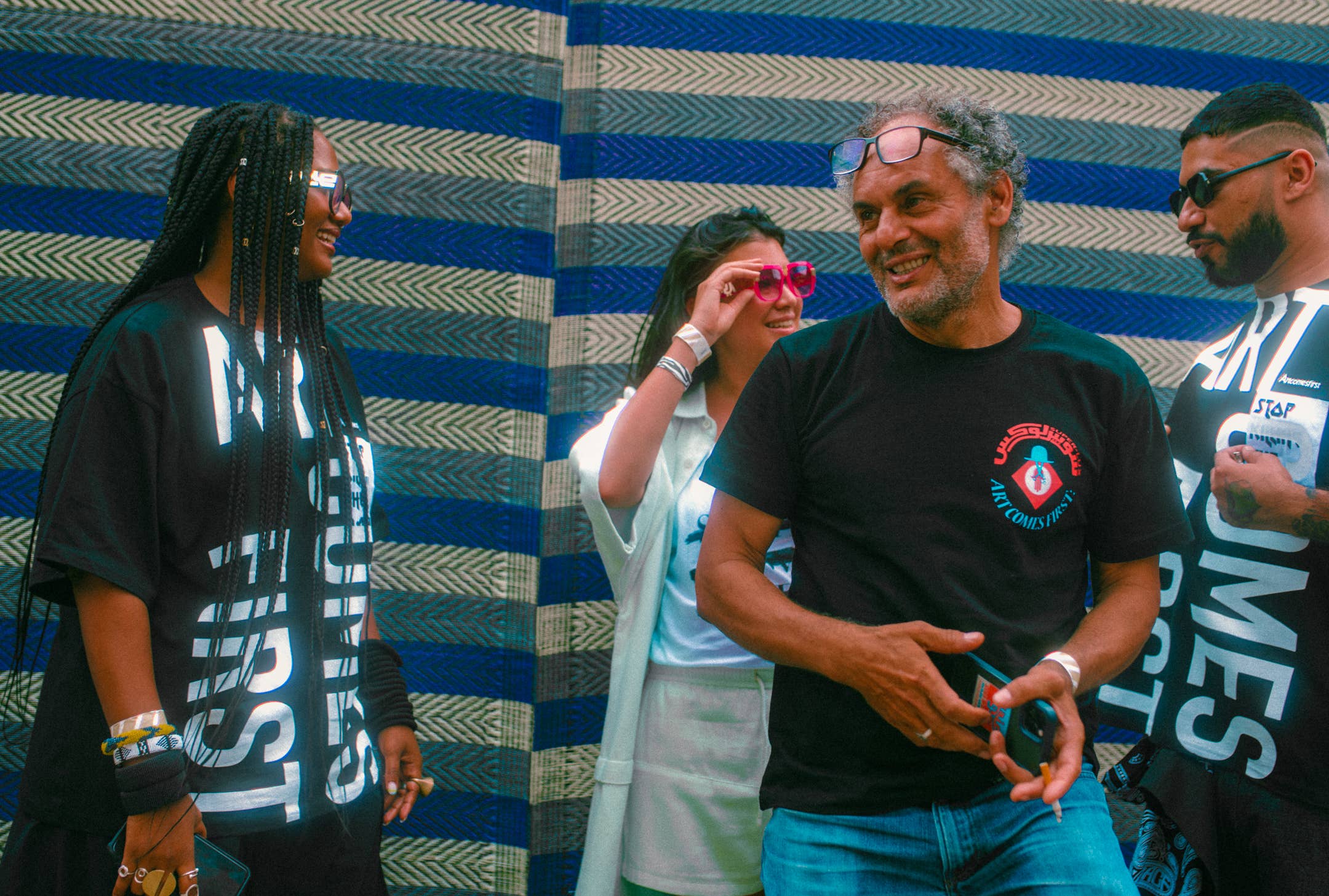
The wealth of rap talent bubbling up in Morocco is far from a secret. The North African country has been churning out some of the finest in Arab-speaking rap for quite some time now, but the West is unforgivably slow at catching on.
One man patiently working away to correct that is Hassan Hajjaj, the Moroccan-born, London-raised, multidisciplinary artist and local hero who’s been a tireless champion of Morocco’s cultural cache. Earlier this month, Hassan and his Jajjah space (a cafe/venue in Marrakech’s blossoming creative district) played host to The Mbari House, an ever-evolving project helmed by Marjana Jaidi of Cultivora—the team behind Oasis Festival—to showcase the arts in Marrakech.
Names like ElGrandeToto, Dizzy DROS, Draganov and Smallx are titans on their home turf. Their deep cuts effortlessly rack up streaming figures some of our biggest stars could only dream of. And that’s on Spotify, a platform most people in the MENA region don’t even use. Combined with the numbers they hit on Anghami—a streaming service that is favoured above Spotify—these local legends consistently hit seven, eight, even nine-figure streams for every single song they put out.

View this video on YouTube
These names don’t just ring out in Morocco—they boast huge fanbases across North Africa and the Middle East—but it hasn’t been so easy. Moroccan rap has its own idiosyncrasies, its own identity and an Arabic dialect not immediately understood even in neighbouring Tunisia or Algeria. According to Khtek, a rising talent and one of the scene’s few woman rhymers, this individuality is a badge of honour for Moroccans.
What makes their brand of rap special, Khtek tells us, “is the fact that our language is not even understood by neighbouring countries like Tunisia and Algeria. Our language is very complex and quite hard to understand; at the same time, it’s very raw and it’s very meaningful as a language. I think the first thing about Morocco is the diversity, because most rappers don’t sound like each other. Still, there are a lot of collaborations, but unlike in Egypt, a country that’s had an industry of entertainment, cinema and music since forever, we don’t have the industry, the means, or the money; but we still fight to exist and to make music.”
For Draganov, whose work as both a rapper and producer has been integral in sculpting Morocco’s rap identity, it’s about keeping local and traditional influences at the heart of what they do. All the outside influences are fine, but you have to do something original with it—and that’s what sets Moroccans apart. “It’s our originality that makes us special,” he says. “It’s our traditional shit. We have Amazigh music, Sahara music, we have Raai music, Jewish music, Anadalusi music, and we have all the booming bass from the U.S. and the 2-step influence from the UK and we can mix all of that together and make something that’s ours.”
View this video on YouTube
More and more with Moroccan artists, just as in the UK rap scene 20 years earlier, there’s a growing pride in digging back into their own heritage for influence. Where Brits dropped the phoney American accents in favour of pronounced East and South London slang, Moroccans are ditching Western beats in favour of traditional Moroccan melodies that use the double harmonic scale (which also appears in various iterations across the Middle East, Asia and parts of Africa). As it turns out, that double harmonic scale actually fits the trap/wave template better than the Auto-Tuned counterparts from the West. If anything, the Auto-Tuned melodies wind up sounding like a pale imitation of these melodies.
Authentic is always best, but that doesn’t mean it’s not worth looking into each other’s cultures to borrow ideas. There are still echoes of UK sounds like garage and grime being occasionally heard, but you couldn’t accuse any of the Moroccan rap scene’s big hitters of imitating anyone. It is, as Draganov points out, something they have to stay conscious of. He mentions Abduh, an artist referencing 2-step garage: “I would love to add some Moroccan sounds on his production also to make it more special because if he already has the 2-step sound you’d recognise in the UK. Even the last cypher we did with ElTotoGrande, ‘Salina’, it was very UK-inspired, but I’d love to make it more Moroccan.”
View this video on YouTube
To a certain degree, it’s part of a wider cultural shift slowly taking place in Morocco right now. Until recently, Morocco—a nexus between North Africa, the Mediterranean and Southern Europe, and the Middle East—considered itself more Mediterranean than African, but that’s changing, both culturally and politically. In 2017, the country rejoined the African Union after thirty years apart (they left after a dispute over the Western Sahara, a subject that remains highly contentious to this day). The decision didn’t just bring a stronger diplomatic relations, it also tied into a wider shift in how Moroccans viewed themselves. King Mohammed VI himself was quoted as saying “Africa is my home, and I am coming back home.” And that’s felt in the music scene, too.
“I think that it’s very important to connect with Africa because we are a part of Africa and we have lived the same atrocities,” Khtek explains. “But African countries have lived through colonialism. I think it’s smart to connect with other countries that have the same same background and with people who are coming from the same place. And it’s way more interesting to collaborate. For example, me collaborating with someone from Tunisia or Algeria or Egypt or any African country, then collaborating with someone from Europe, it can be beneficial when it comes to views and things. But it’s also interesting and ultimately more fulfilling to work with a Nigerian rapper.”
That authenticity, and pride in their heritage, is paying off—even when audiences aren’t familiar with those cultural touchstones. In Draganov’s experience, audiences are responding eagerly to artists who wear their culture with pride. “Recently, I had a concert with another Moroccan artist, Stormy, in Paris,” he says. “There is a big community of Moroccans and North Africans all over France, so we did a sold-out show. The fact that we went to Paris and everyone was singing all the words, it was very, very eye-opening because you understand that our music can’t be exported through the language, but it can be exported through the vibes. I did another concert in France, and most of the public were French people and they didn’t understand what I was saying, but they went crazy for the music.”
View this video on YouTube
Exporting that and bridging the dialectic barriers across the Arab-speaking world is one thing, but taking Moroccan music even further brings its own challenges. As Khtek tells me, touring as an Arab-speaking artist from a Muslim country is still prohibitively expensive and, in a lot of cases, flat-out impossible. “We don’t have easy access to visas and this is a big problem for every artist in Morocco,” she says, “because we don’t have access to other countries. So we have this problem with borders. But if there wasn’t this problem with us and this hierarchy between white people and us, it would be easier for us to export and do whatever we want anywhere.”
But that all could change. Although the infrastructure lacks and there are international hurdles to overcome, the growing swell of support at home is working its way through government and the establishment. As with a lot of places, rap was once a dirty word, a genre beset by various racially-charged prejudices, but the government appears to be slowly warming up to the idea of Moroccan rap as a cultural export. There’s a long way to go, but Khtek explains there are a few reasons to be cautiously optimistic.
“There’s a new Minister of Culture,” she says, “and he’s being very open with rappers. He’s talking to rappers, meeting them in person. I think it’s a very good step, but I think these things should always be like this, not because someone is trying to prove himself through his political parties. I think it’s good for us to help communicate with the Ministry, but at the same time, I’m suspicious of everything related to the government and what their intentions are. It’s cool to now have these opportunities where rappers are included in many programmes, but we should have much more support in general because rap is the most popular music in the world.”










